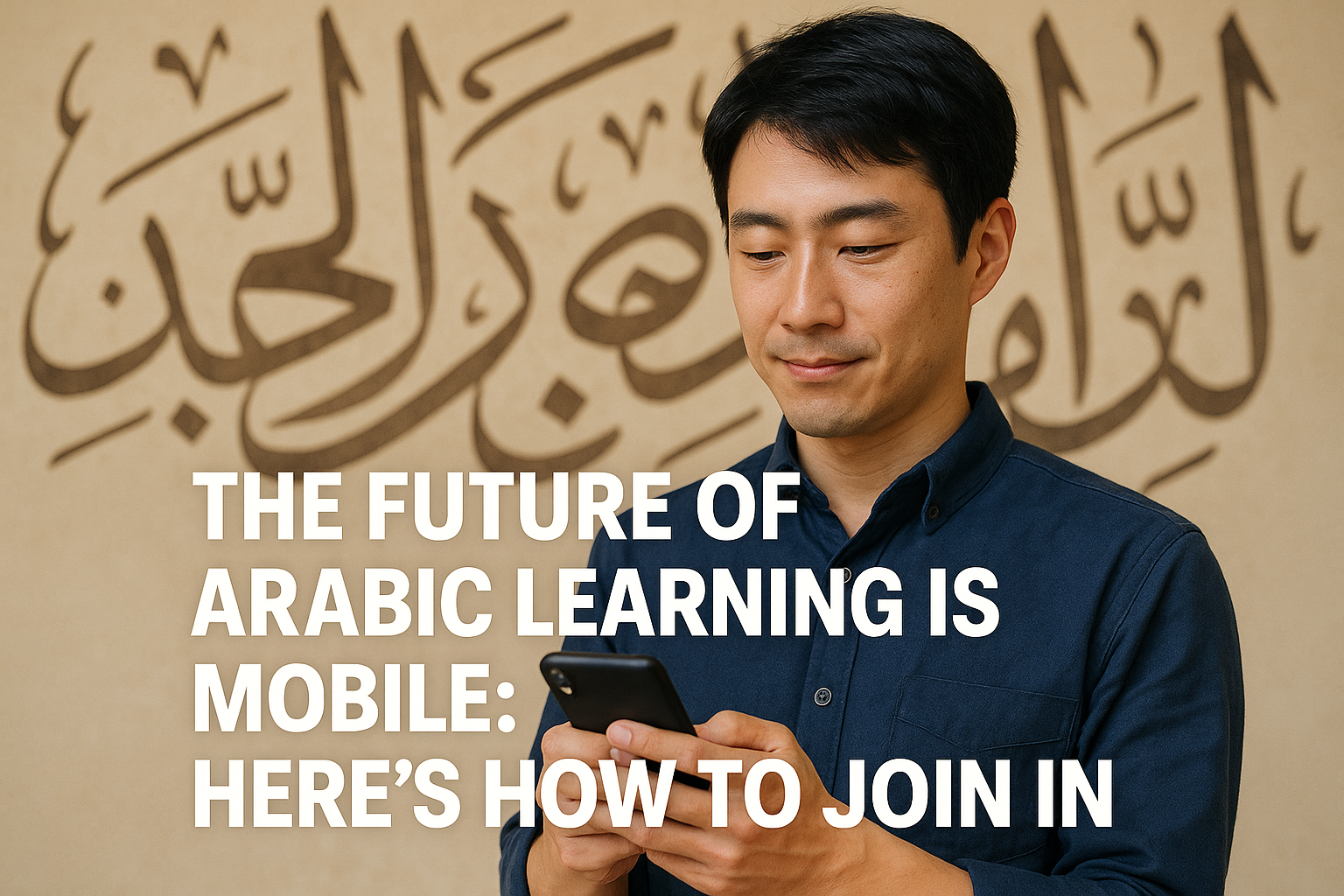The Future of Arabic Learning Is Mobile: Here’s How to Join In

Learning Arabic has long been considered a challenging yet highly rewarding endeavor. Whether for business, travel, religious purposes, or cultural enrichment, Arabic remains one of the most important and widely spoken languages in the world. However, the traditional methods of learning Arabic—classroom lectures, bulky textbooks, and limited access to native speakers—often leave learners feeling overwhelmed and disconnected.
Today, the landscape of Arabic learning is rapidly changing, driven by advances in mobile technology. The future of Arabic learning is mobile, and it’s transforming how students from around the globe engage with the language. Mobile devices, apps, and online platforms are making Arabic learning more accessible, flexible, and engaging than ever before.
If you want to stay ahead of this trend and truly benefit from modern language learning tools, here’s everything you need to know about the future of Arabic learning being mobile—and how you can join this exciting revolution.
Why the Future of Arabic Learning Is Mobile
1. Accessibility Anytime, Anywhere
One of the most powerful reasons why the future of Arabic learning is mobile lies in accessibility. Smartphones and tablets allow learners to study Arabic wherever they are—whether on a commute, during lunch breaks, or relaxing at home. This convenience breaks down the barriers of time and place that once limited traditional classroom learning.
Imagine practicing Arabic vocabulary while waiting in line or listening to Arabic conversations during a morning jog. Mobile learning means you can maximize every moment of your day, making language study a seamless part of your routine.
2. Interactive and Personalized Learning
Mobile Arabic learning platforms are designed with interactive features that traditional books can’t offer. From audio pronunciation guides and speech recognition to quizzes and flashcards, mobile apps provide an immersive, hands-on experience.
Moreover, many platforms use artificial intelligence to personalize lessons based on your strengths and weaknesses. This adaptive learning ensures you focus on what you need most, accelerating your progress. This interactivity is a core reason why experts agree that the future of Arabic learning is mobile—because it makes learning more engaging and efficient.
3. Community and Social Learning
Learning a language is not just about memorizing words—it’s about connecting with people. Mobile platforms often integrate social features such as chat rooms, discussion forums, and live tutoring sessions that connect learners worldwide.
This social dimension fosters motivation, cultural exchange, and real-time practice, which are critical for mastering Arabic. The future of Arabic learning is mobile because mobile technology brings the global Arabic learning community together in ways never before possible.
How to Join the Future of Arabic Learning on Mobile
Step 1: Choose the Right Mobile Learning Platform
With the surge in mobile Arabic learning, choosing the right platform is crucial. Not all apps and websites offer the same quality, structure, or support. Look for platforms that provide:
-
Comprehensive Arabic courses covering reading, writing, listening, and speaking
-
Native speaker audio and pronunciation guides
-
Interactive exercises and quizzes
-
Personalized learning paths
-
Affordable pricing and trial options
One of the best examples is Al Arabiya Institute, which offers expertly designed Arabic online courses with a focus on convenience, quality, and affordability. Their mobile-friendly courses make it easy to learn Arabic anytime, anywhere. Plus, they provide free trial lessons, so you can explore their platform risk-free.
Step 2: Set Clear Goals and Consistent Study Times
Even the best mobile platform won’t guarantee success without a clear plan. Define your goals—whether it’s conversational fluency, Quranic Arabic, or business language skills—and set realistic daily or weekly study times.
Use your mobile device’s calendar and reminder features to build consistency. Since the future of Arabic learning is mobile, making your smartphone your study buddy will help you stay motivated and on track.
Step 3: Use Mobile Tools to Practice Daily
Take advantage of the many mobile tools to complement your learning:
-
Language flashcard apps like Anki or Quizlet for vocabulary building
-
Voice recording apps to practice pronunciation and self-assess
-
Language exchange apps to connect with Arabic speakers
-
Podcast apps to listen to Arabic content on the go
These tools enhance your experience and reinforce the idea that the future of Arabic learning is mobile—dynamic, accessible, and engaging.
Benefits of Mobile Arabic Learning Compared to Traditional Methods
Flexibility
Unlike fixed classroom schedules, mobile learning lets you study when you want. This flexibility means that whether you’re a busy professional, student, or traveler, you can fit Arabic study into your life seamlessly.
Cost-Effectiveness
Mobile Arabic courses typically cost less than in-person classes or private tutoring. Many apps offer free versions or trial lessons, making learning Arabic affordable and risk-free. Platforms like Al Arabiya Institute offer some of the best prices with high-quality instruction, reflecting why the future of Arabic learning is mobile and budget-friendly.
Up-to-Date Content
Mobile platforms can quickly update their content to reflect new vocabulary, slang, or cultural trends. This immediacy helps learners stay current with how Arabic is spoken today, especially important for Modern Standard Arabic (MSA) and dialects.
Gamification and Motivation
Mobile learning apps often incorporate gamification—points, badges, leaderboards—that turn studying into a fun challenge. This boosts motivation and helps learners maintain consistency.
Challenges and How Mobile Learning Addresses Them
Challenge: Lack of Speaking Practice
One of the biggest drawbacks of self-study is the lack of real conversation. However, the future of Arabic learning is mobile because mobile platforms now include live tutors, video calls, and speech recognition technology that simulate conversation practice.
Challenge: Staying Motivated Long-Term
Many learners start strong but lose momentum. Mobile apps tackle this with notifications, reminders, and social engagement features that keep you accountable and inspired.
Challenge: Quality of Resources
Not all mobile Arabic learning apps are created equal. The future of Arabic learning is mobile, but it requires discerning learners to choose reputable platforms like Al Arabiya Institute, which combines expert teachers with effective curriculum design.
What Makes Al Arabiya Institute a Leader in the Mobile Arabic Learning Revolution?
At Al Arabiya Institute, the commitment is to make Arabic learning accessible, effective, and enjoyable through mobile technology. Here’s what sets them apart:
-
Expert Instructors: Qualified native Arabic teachers with years of experience.
-
Flexible Courses: Options for beginners to advanced learners, tailored to your needs.
-
Mobile-Friendly Platform: Fully optimized for smartphones and tablets.
-
Affordable Pricing: Competitive rates with free trial lessons to get you started.
-
Comprehensive Curriculum: Focus on all language skills—speaking, reading, writing, and listening.
-
Interactive Learning: Real-time feedback, live sessions, and community interaction.
These features reflect why the future of Arabic learning is mobile and why Al Arabiya Institute is one of the best websites to learn Arabic online today.
Final Thoughts: Embrace the Future of Arabic Learning Today
The future of Arabic learning is mobile, and that future is here now. Mobile technology breaks down traditional barriers of time, cost, and accessibility, making it easier for you to learn Arabic no matter where you are in the world.
By choosing the right platform, setting clear goals, and using the mobile tools at your disposal, you can join millions of learners already benefiting from this revolution. For those who want quality instruction, affordable prices, and a proven track record, Al Arabiya Institute stands out as one of the best websites offering Arabic online courses with free trial lessons.
Don’t wait to be left behind. Step into the future today, and make your Arabic learning journey mobile, flexible, and successful.
Visit https://learning-arabic.com/ to explore courses, start your free trial, and join the movement where the future of Arabic learning is mobile.








